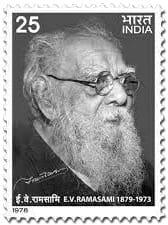Periyar Birth Anniversary: Honoring a Visionary Social Reformer
By Amit Kumar

Erode Venkatappa Ramasamy, popularly known as Periyar, was born on September 17, 1879, in Erode, Tamil Nadu. He was a prominent Indian social activist and politician, best known for founding the Self-Respect Movement and the Dravidar Kazhagam. Periyar is recognized for his relentless efforts to promote rationalism, self-respect, women’s rights, and the eradication of caste discrimination in Tamil society.
Periyar joined the Indian National Congress in 1919 but resigned in 1925, dissatisfied with the party serving mainly Brahmin interests. He was a vocal critic of Brahminical dominance and the caste system, advocating for the rights and dignity of the non-Brahmin Dravidian people. One of his significant social contributions was participating in the Vaikom Satyagraha in 1924, a protest movement aiming to allow lower castes to access public roads near temples in Kerala. His leadership in this and other movements earned him widespread respect among marginalized communities.
In 1939, Periyar became the leader of the Justice Party, which he later transformed into the Dravidar Kazhagam in 1944. This organization focused on social justice, self-respect, and the promotion of Dravidian identity. The party eventually split, leading to the formation of the Dravida Munnetra Kazhagam (DMK) in 1949. Throughout his life, Periyar strongly advocated for gender equality, working to dismantle oppressive customs such as child marriage and dowry practices.
Since 2021, the government of Tamil Nadu has officially observed Periyar’s birth anniversary as Social Justice Day, celebrating his legacy and commitment to creating an equitable society. This day is marked by ceremonies and pledges to uphold the values Periyar championed: rationalism, equality, and social justice.
Periyar’s contributions remain integral to Tamil Nadu’s social and political fabric, highlighting his enduring impact as a reformer who dedicated his life to fighting caste inequality and empowering the marginalized
